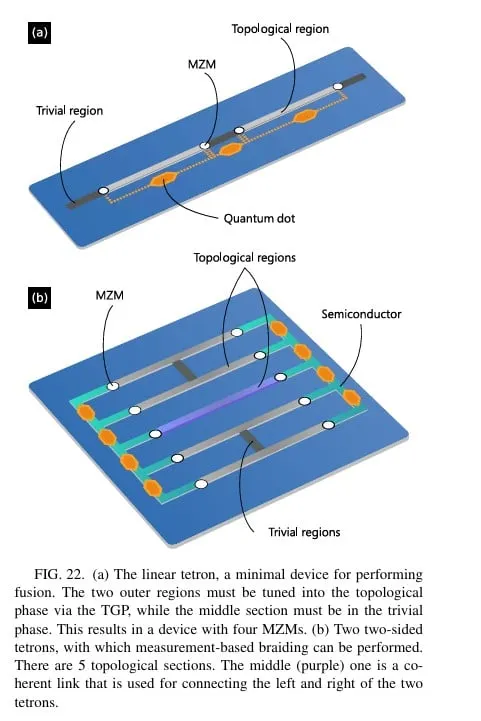On Wednesday, Microsoft unveiled Majorana 1, a quantum chip powered by an exotic state of matter that's neither liquid, solid, nor gas, called topological superconductivity.
The breakthrough, detailed in the scientific journal Nature, uses a custom-built material known as a topoconductor to create and control Majorana particles, potentially scaling quantum computing to solve previously impossible problems.
In essence, a topconductor is a semiconductor—material that can conduct energy—that also acts as a superconductor that conducts electricity with minimum energy loss, usually at extremely low temperatures.
Creating such material required atomic engineering precision and supercooling to 400 degrees below zero, but Microsoft emphasized that the complexity and expensiveness of the effort are worth it, considering all the benefits.
“With this material, we can build a whole new foundational architecture for our quantum computers, a topological core, allowing us to scale to not tens or hundreds of qubits on a chip, but millions, all in the palm of your hand,” Krysta Svore, technical fellow at Microsoft said in a company video.
The project is the longest-running in Microsoft's history and began at the beginning of this century when Bill Gates was CEO.
A million-qubit quantum computer built with controllable qubits under the Majorana architecture could tackle problems beyond the reach of today's most powerful supercomputers.
That includes designing self-healing materials, creating catalysts to break down microplastics, developing enzymes to boost food production in harsh climates, or exposing private Bitcoin keys.
“Imagine a chip that can fit in the palm of your hand yet is capable of solving problems that even all the computers on Earth today combined could not,” Microsoft CEO Satya Nadella tweeted shortly after the announcement. “It’s not about hyping tech; it’s about building technology that truly serves the world.”
A couple reflections on the quantum computing breakthrough we just announced...
Most of us grew up learning there are three main types of matter that matter: solid, liquid, and gas. Today, that changed.
After a nearly 20 year pursuit, we’ve created an entirely new state of… pic.twitter.com/Vp4sxMHNjc
— Satya Nadella (@satyanadella) February 19, 2025
Current versions of the chip contain eight topological qubits, but Microsoft claims the architecture could scale to one million qubits on a single palm-sized chip.
This would smash through current limitations in quantum computing.
"Majorana (is) the world’s first Quantum Processing Unit powered by a topological core, designed to scale to a million qubits on a single chip," Chetan Nayak, corporate vice president of Microsoft’s Quantum Hardware Division, said. "Microsoft is on track to build an FTP (fault-tolerant prototype) of a scalable quantum computer—in years, not decades."
Solving the quantum problem?
The chip works by coaxing exotic Majorana particles into existence within a specialized material made of indium arsenide and aluminum.
When cooled to near absolute zero and tuned with magnetic fields, this material enters a topological superconducting state–not a solid, liquid, or gas, but something fundamentally different.
Microsoft claims that the Majorana project is a breakthrough in making qubits less unpredictable, one of the key challenges quantum computing has faced.
“Majorana 1 allows us to create a topological qubit. A topological qubit is reliable, small, and controllable. This solves the noise problem that creates errors in qubits,” Svore said. “Every single atom in this chip is placed purposefully. It is constructed from ground up, it is entirely a new state of matter.”
Scientists have been inching closer and closer to reaching this point for the past decade.
Unlike other quantum computing approaches, Microsoft's topological qubits are naturally protected against environmental noise that typically disrupts quantum states.
The software and technology giant claims its new measurement technique boasts the sensitivity to detect minute variations in electron counts—a critical factor for reliably reading qubit states.

The company's approach attracted the attention of the Defense Advanced Research Projects Agency, which included Microsoft in its program to evaluate whether innovative quantum tech could build commercially relevant systems faster than conventionally believed possible.
Microsoft is now one of two companies invited to the final phase of DARPA's Underexplored Systems for Utility-Scale Quantum Computing program.
The company's approach differs significantly from competitors like Google and IBM, who use different qubit technologies, claiming its architecture simplifies control requirements by using voltage pulses like flipping light switches rather than finely tuned analog controls for each qubit.
The Majorana 1 chip is designed to fit into a quantum system designed to operate within Azure data centers.
Microsoft plans to continue refining the technology through research collaborations before making it commercially available.
Edited by Sebastian Sinclair
Generally Intelligent Newsletter
A weekly AI journey narrated by Gen, a generative AI model.

 6 months ago
85
6 months ago
85




 English (US) ·
English (US) ·